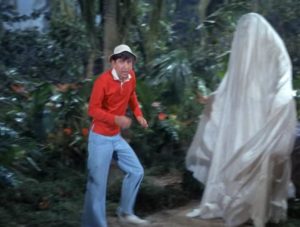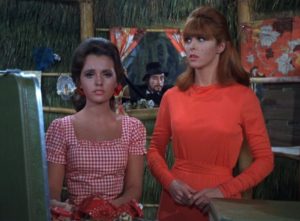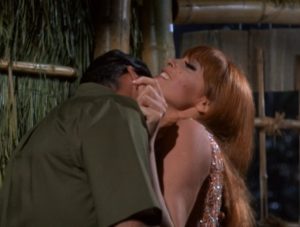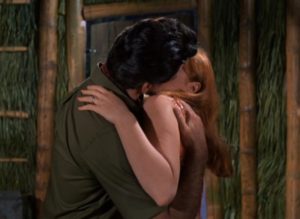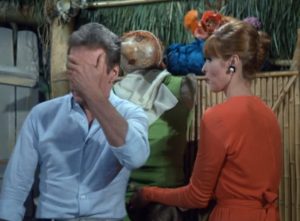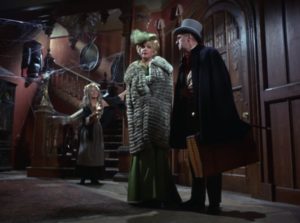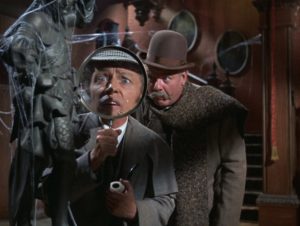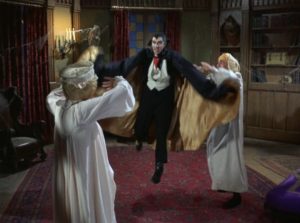Gilligan’s Island (seasons 2 and 3)
As the second season of Gilligan’s Island commenced (1965–1966), the adventures of the castaways began to be presented in color. Furthermore, composer Gerald Fried more consistently prepared the episodes’ underscores in both seasons two and three, and in the early part of season three, there are longer cues with fuller textures. Some cues are even jazzed up a bit, and Fried used additional musical quotations of tunes from beyond the Gilliganverse, such as “Rule, Britannia,” to good effect. Sadly, the richer approach to underscores did not persist through to the conclusion of season three.
There are many episodes in season two that I can clearly remember watching (and enjoying) in the late 1970s, particularly “Smile, You’re on Mars Camera,” “The Sweepstakes,” “Quick Before it Sinks,” “The Chain of Command,” “Don’t Bug the Mosquitoes” (I still enjoy the women’s musical trio), “Not Guilty,” “You’ve Been Disconnected” (a telephone cable washes up on shore), “Gilligan’s Living Doll” (remember the robot!?), “Forward March,” “Feed the Kitty” (don’t you love that lion?), “Operation: Steam Heat,” “Ghost A Go-Go,” and the “Friendly Physician,” with its mad scientist, Dr. Boris Balinkoff (Vito Scotti), and bizarre body swapping. As I rewatched these memorable episodes this past month, I enjoyed them again after the decades-hiatus but felt that season two had less charm than did season one.
Indeed, as silly as season one gets with its numerous other inhabitants on the island whom the castaways just happen to keep discovering, season two episodes such as “Smile, You’re On Mars Camera,” “The Little Dictator,” and “The Friendly Physician” slide into the realm of the absurd. Furthermore, while I remembered the nuclear explosion at the end of “Forward March,” it was far more jarring to me now, as was the boat explosion (and could-have-been murder of the castaways) in “Ghost A Go-Go.” At least in that episode, Richard Kiel plays The Ghost / Soviet Agent in such an over-the-top manner that one gets the sense that we’re not to take any of this too seriously. The same can be said for Dr. Balinkoff.
But in terms of being jarring, no episode matches “The Hunter” from season three.
In that episode, big-game hunter Jonathan Kincaid (Rory Calhoun) arrives on the island in search of his next hunting challenge. After discovering that there is no game on the island (where did the earlier apes and gorillas go?), Kincaid announces he will hunt Gilligan instead. Despite its laugh tracks, “The Hunter” is profoundly dark, and the dramatic (and realistic) reactions by both Lovely Howell and the Professor to Kincaid’s announcement (see picture below), as well as the new suspenseful musical cues for this episode, 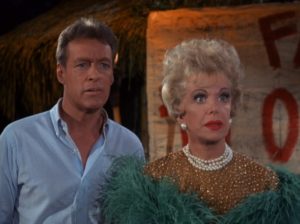 leave no doubt in my mind: this episode reached a level of seriousness unmatched by any other episode in the series. Unlike Dr. Balinkoff and the Ghost, Kincaid is not played for laughs. Indeed, Kincaid’s reaction to Ginger’s standard (feigned), manipulative come-on is also the most realistic response in the entire series because the kiss that Kincaid/Calhoun shares with Grant/Louise is the only one that suggests it is grounded in genuine adult sexual passion.
leave no doubt in my mind: this episode reached a level of seriousness unmatched by any other episode in the series. Unlike Dr. Balinkoff and the Ghost, Kincaid is not played for laughs. Indeed, Kincaid’s reaction to Ginger’s standard (feigned), manipulative come-on is also the most realistic response in the entire series because the kiss that Kincaid/Calhoun shares with Grant/Louise is the only one that suggests it is grounded in genuine adult sexual passion.
(Compare the realism of Kincaid’s kiss to the typically bashful or naive responses of Gilligan or the Professor to Ginger.)
All this creates an all-too-real villain in Kincaid who is far more believable than are the various Cold War Soviets who show up on the island. In short, “The Hunter” is a very strange episode, and I am left wondering what 1960s viewers thought about this episode. Did they feel that the writers had crossed a line, abandoning innocent comedic mayhem for representations of human cruelty about which I have never wanted to laugh? And speaking of the 1960s, what did viewers of the day think of that nuclear explosion?
Still, the comedic elements of season1 that I like so much—disguises and costumes, slap stick by Gilligan and the Skipper, and dream sequences—continue in seasons 2 and 3. And while I still found the dream sequence in which Gilligan becomes a life-sized (political) puppet in “The Little Dictator” emotionally terrifying, I laughed heartily yet again during Mr. Howell’s wild-west dream in “The Sweepstakes.” The line, “I haven’t had a bath in forty years!”, delivered by Mr. Howell as a gold prospector, still tickled me, but with much more experience during the past two decades watching 70 years worth of Westerns, I enjoyed the collection of parodied Western characters more thoroughly than I could have done as a child.
I was surprised that season 3’s episodes felt less familiar to me. I certainly remember “High Man on the Totem Pole,” “The Pigeon” (with its huge spider, an effect which has not aged well), and “All About Eva,” which I appreciated far more now than I did as a little boy — Tina Louise shines as an actress in that episode — but season 3 did not radiate as much familiarity as did season 2. That said, I vaguely remember the episode “Up to Bat”—with its Hammeresque dream sequence during which Gilligan is a clumsy vampire; that episode has now become my absolute favorite in the series! The acting in the dream sequence is especially good for Gilligan’s Island, the haunted mansion set is quite fine for 1960s television, and the affection that the other characters express for Gilligan in “the real world” scenes come across as heart-felt and true. Here’s a cast that seems to have hit their stride.
Finally, with seasons 2 and 3 of Gilligan’s Island, the series is no longer haunted by World War II. Instead, the Cold War presses in on its stories, and Japanese stereotypes give way to Soviet/Russian ones. Was this the result of the escalating violence in Vietnam between 1965 and 1967? I find myself wanting to revisit other American sitcoms from the late 1960s to see if I can identify similar changes within their patterns of storytelling that might also point to the growing shadow of Vietnam on American life.
Stan Pelkey
November 14, 2017
